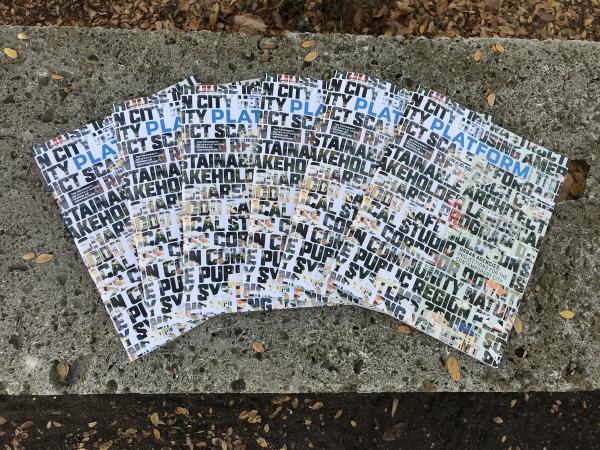2020–2021 Issue of PLATFORM Explores the Role of Urban Design in Addressing Complex, Twenty-First Century Challenges

As cities and communities around the world respond to the contemporary moment—where tensions between economic opportunity, climate change, affordability, public health, and available resources are atomizing the urban environment—The University of Texas at Austin School of Architecture’s 2020–2021 issue of PLATFORM explores issues impacting the future of cities and demonstrates ways the academy can contribute to the debate on how cities should respond to complex, twenty-first-century challenges.
Edited by Dean J. Almy III, Associate Professor and Director of the Graduate Program in Urban Design, PLATFORM: Urban Agencies—Projections for the Contemporary City features scholarship from faculty, staff, alumni, and students from across the school’s disciplines, exploring issues from density, public infrastructure, and the ways people move around the city during COVID-19, to deepening socio-spatial segregation and community engagement.
“The Graduate Program in Urban Design stands at the nexus of the varied disciplines within the school that address the built environment, and provides a lens through which applied research and discourse on the design of cities can be focused,” Almy said. “As cities, societies, and the issues they face become more complex, it is necessary that we shift the conversation away from segregated professional and academic milieus to one that enables the diversity of knowledge generated across disciplines to amalgamate.”
This focus on academic diversity and interdisciplinary exchange is central to Urban Agencies—Projections for the Contemporary City, with topical essays by faculty, students, and alumni from the disciplines of architecture, community and regional planning, landscape architecture, and urban design. Essay titles and authors include:
- “A Revised Climate for the Design of Cities,” by Professor Simon Atkinson
- “Bayou City Townhouse Boom: Does Houston Have Something to Teach Us About Pro-Climate Urban Transformation,” by Associate Professor Jake Wegmann
- “The Optimism of the City,” by Associate Professor Dean Almy
- “Transdisciplinary Design for a Future Cascadia,” by Assistant Professor Maggie Hansen
- “Austin: Past, Present, and Future of a Landscape City,” by Professor Juan Miró
- “The Future of Cities Lies in the Replacement of Suburbia,” by Professor Wilfried Wang
- “Change Agent: Interview with Sinclair Black, FAIA,” with Juan Miró
- “Catalyzing Transformation in Downtown Lubbock,” by urban design alumna and Director of Urban Design at Overland Partners, Samantha Whitney Schwarze
- “A Home is Not a House: New Strategies for Medium-Density Housing,” by Lecturer Martin Haettasch
- “Moving Through the City During a Pandemic,” by Associate Professor Junfeng Jiao and MSCRP student Josiah Lindquist
- “Community and Stakeholder Engagement: Tools for Successful Placemaking,” by Assistant Director of Research Administration at UTSOA’s Center for Sustainable Development Sarah Wu
- “West Rail Corridor Study: Designing a New City Place in South Texas,” by UTSOA’s 2017–18 Race & Gender in the Built Environment Fellow and current Assistant Professor at the University of Wisconsin-Madison, Edna Ledesma
The 2020–2021 issue of PLATFORM comes on the heels of a transformative $5 million gift to the urban design program by the School of Architecture’s longest-serving faculty member Professor Emeritus Sinclair Black, FAIA. Under Almy’s leadership, Black’s gift has already impacted the trajectory of the program by providing support for a new, interdisciplinary studio sequence to study urbanization in the Pacific Northwest (Hansen, p. 26); sponsoring visiting studio critics and lecturers (Almy, p. 18); and significantly enhanced student support.
Urban design research has also been an instrumental aspect of the Center for Sustainable Development's recent projects with the City of Austin including the Austin Convention Center report, and this summer’s St. John’s site analysis. These large-scale scenario-based research projects are part of a growing number of collaborations between the School of Architecture and the City of Austin, which, over the past few years, have enabled the school to increasingly serve as a knowledge partner for the city.
“As academics with expertise in all scales of the built environment, we’re able to offer thorough, independent perspectives that are measured by research and equitably founded,” Michelle Addington, Dean of the School of Architecture stated. “And, as indicated by the essays presented within this issue of PLATFORM, the agency and focus of our urban design program offers up an interdisciplinary lens through which to coalesce the scholarly efforts of faculty and students, and to knit together our disciplines’ many streams of thought into tangible directions and actions that best serve our urban communities, now and in the future.”
For more information, and to read the full issue online, visit: PLATFORM: Urban Agencies—Projections for the Contemporary City

